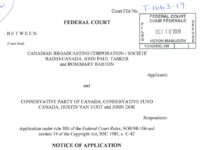As the 2019 federal election winds toward voting day next week, copyright has unexpectedly arrived on the scene. Cultural groups have lamented for weeks that none of the national political parties have discussed copyright, placed it in their platforms, or otherwise committed to reforms. The likely reason – neatly articulated by OpenMedia’s Laura Tribe in this week’s Lawbytes podcast – is that there are no sharp divisions between the parties on copyright that might provide an electoral advantage. Instead, the government conducted an extensive copyright review which led to the Industry Committee’s June 2019 report. That committee, which heard from hundreds of witnesses representing all perspectives, generated a report that received all-party support and provides a roadmap for future reforms (the notable exception being on crown copyright).

Fair Dealing by Giulia Forsythe (CC BY-NC-SA 2.0) https://flic.kr/p/dRkXwP
Copyright
The LawBytes Podcast, Episode 27: Digital Policy and Election 2019 – Laura Tribe of OpenMedia on Where the Parties Stand
Digital issues were expected to garner attention in the 2019 Canadian federal election campaign. Over the course of the past few weeks, all the main political parties have had something to say about the high cost of cellphone prices in Canada and the prospect of implementing new taxes on tech companies. Laura Tribe, the Executive Director of OpenMedia, joined the podcast to talk about election 2019 and digital policies in a conversation that focused on wireless services and Internet taxes as well as privacy, intermediary liability, trade, and copyright.
CBC vs. CPC: Why the CBC’s Attempt to Use Copyright to Stifle Expression Backfired Badly
The CBC’s copyright infringement lawsuit against the Conservative Party over the use of seven short video clips in a campaign ad and several Twitter postings sparked a torrent of criticism as even CBC supporters wondered what executives were thinking. My Globe and Mail op-ed notes that the public broadcaster claimed it was defending the independence of its journalists and journalism, yet the opposite predictably occurred, with many believing that the lawsuit itself demonstrated a political bias.
CBC Sues the Conservative Party of Canada for Copyright Infringement Citing Campaign Video, Posting Debate Excerpts on Twitter
The CBC has filed a copyright infringement lawsuit against the Conservative Party over the use of clips on its Not As Advertised website and the use of debate clips on its Twitter feed. The lawsuit, filed yesterday in federal court, claims that a campaign video titled “Look at What We’ve Done” contained multiple excerpts from CBC programming in violation of copyright law. Moreover, the CBC also cites tweets that included short video clips of between 21 seconds and 42 seconds from the English-language leaders’ debate. The CBC argues that posting those clips on Twitter also constitutes copyright infringement.











